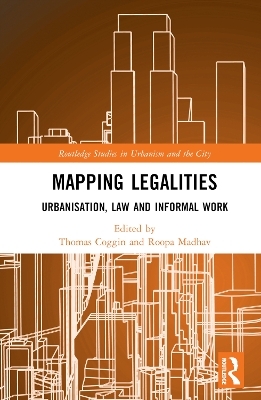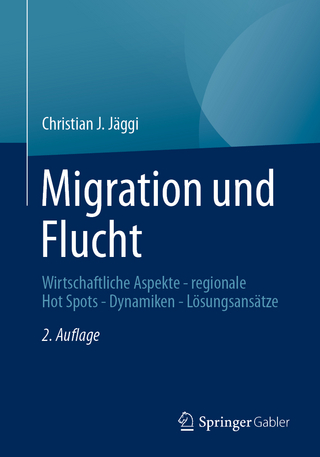
Mapping Legalities
Routledge (Verlag)
978-1-032-47158-7 (ISBN)
This book maps the interactions between informal workers and the law within the urban and spatial environment. It focuses on access to physical space, revealing the punitive ways in which law regulates space and informal work which relies on space.
Across various cities worldwide, the chapters in this book uncover how informal workers remain at the policy and legal margins of urban society and reveal their ongoing endeavour for social and legal protection within local jurisdictional contexts. It spans multiple themes, ranging from street vending to informal work in the gig economy. They shed light on the collective influence of the law and the pursuit of a modern city in contributing to the marginalisation of informal workers. Despite this, the chapters illuminate the strategies employed by informal workers to leverage the law in acknowledging their contributions and asserting their presence in the city.
The book is targeted towards an academic audience and practitioners specialising in law, urban studies and the informal economy. The reader will gain an in-depth and cross-jurisdictional understanding of the indispensable role played by informal workers in providing services to a broader urban population, ranging from street vendors to sanitation workers and sex workers.
Thomas Coggin is a senior lecturer at the University of the Witwatersrand. His research is concerned with the ways in which property law systemically structures the appropriation, access and use of everyday space in the contemporary urban and spatial environment. He is a co-coordinator of the International Research Group on Law & Urban Space and a member of the Researcher & Statisticians Constituency of WIEGO. He is an alumnus of the Managing Global Governance programme of the German Development Institute, and he holds a Doctor of Juridical Sciences (SJD) degree from Fordham University. Roopa Madhav is a consultant with the Law Programme WIEGO and was the joint coordinator of a three-country study on ‘Law and Informal Economy’ for WIEGO (Women in Informal Employment: Globalizing and Organizing). She is also Professor of Law (Research) at the National Law University Delhi. She was a research fellow at the International Environmental Law Research Centre, working on a project mapping water law reforms in the country. She has been faculty at the Tata Institute of Social Sciences, visiting faculty at the National Law School and Tamil Nadu National Law University. She is co-editor of Water Law for the Twenty-First Century – National and International Aspects of Water Law Reform in India, Routledge, 2009, and Water Governance in Motion: Towards Socially and Environmentally Sustainable Water Laws 2010, New Delhi. She holds a PhD (Law) from SOAS, University of London, LLM from New York University and a BA/LLB from National Law School of India University, Bangalore.
Introduction
1. Urban regulation for self-employed informal workers
Sally Roever & Michael Rogan
2. Disambiguating legalities: Street vending, law, and boundary work in Mexico City
Tiana Bakić Hayden
3. Power dynamics and the regulation of street vending in the urban space: The law on the books and the law on the ground in Accra and Dakar
Teresa Marchiori & Pamhidzai Bamu
4. Differential effects of vending formalisation in New York City, USA
Ryan Thomas Devlin
5. Local government regulations and the dispossession of urban informal vendors in Delhi, India
Ankit K. Singh & Roshni Yadav
6. Impact of new planning policies on sustenance and inclusivity of street trading in Dhaka: A critical review of Detailed Area Plan 2016-2035
Nabanita Islam
7. Advocating for a Livelihood-Centric Master Plan: Learnings from Delhi
Malavika Narayan, Shalini Sinha, Avi Singh Majithia
8. Turbulent transformations and urban undesirables: Revanchist urban transition and street-based sex work in Bangalore
Neethi P & Anant Kamath
9. Overlooked mobility: Domestic workers commuting in Bogotá, Medellín, and Sao Paulo
Valentina Montoya Robledo
10. New perspectives on the work of waste pickers: the construction of a “recycling node” in Mercedes, Argentina
Verónica V. Puricelli
11. Pursuing aspirations for decent sanitation work: How informal workers navigate the universe of rules that shape sanitation practices in urban Africa
Julian Walker; Adriana Allen; Ibrahim Bangura; Pascale Hofmann; Wilbard Kombe; Nelly Leblond; Tatu Limbumba; Catarina Simões Mavila; Claudy Vouhé; Julia Wesely
12. Urban informal workers’ Covid-19 compliance: Evidence on social capital and enforcement politics from Indonesia
Ying Gao
13. Informal Work and the Social Function of the City: A Framework for Legal Reform in the Urban & Spatial Environment
Thomas Coggin
| Erscheinungsdatum | 10.07.2024 |
|---|---|
| Reihe/Serie | Routledge Studies in Urbanism and the City |
| Zusatzinfo | 10 Tables, black and white; 20 Line drawings, black and white; 1 Halftones, black and white; 21 Illustrations, black and white |
| Verlagsort | London |
| Sprache | englisch |
| Maße | 156 x 234 mm |
| Gewicht | 730 g |
| Themenwelt | Naturwissenschaften ► Geowissenschaften ► Geografie / Kartografie |
| Recht / Steuern ► Allgemeines / Lexika | |
| Recht / Steuern ► Arbeits- / Sozialrecht ► Arbeitsrecht | |
| Recht / Steuern ► Arbeits- / Sozialrecht ► Sozialrecht | |
| Recht / Steuern ► EU / Internationales Recht | |
| ISBN-10 | 1-032-47158-1 / 1032471581 |
| ISBN-13 | 978-1-032-47158-7 / 9781032471587 |
| Zustand | Neuware |
| Informationen gemäß Produktsicherheitsverordnung (GPSR) | |
| Haben Sie eine Frage zum Produkt? |
aus dem Bereich


